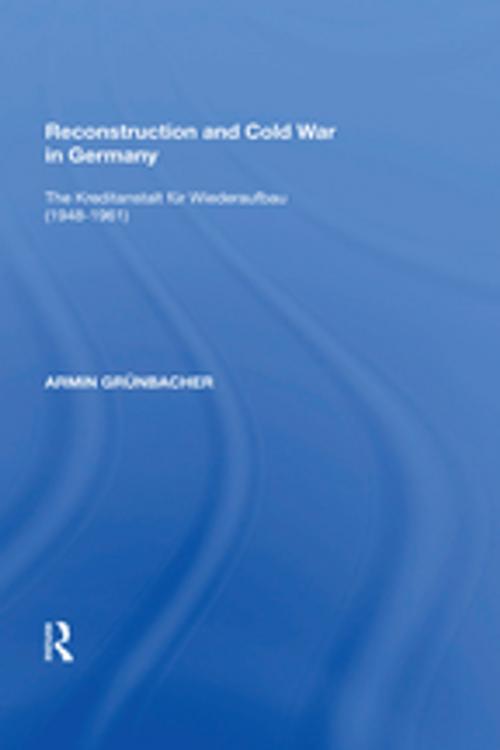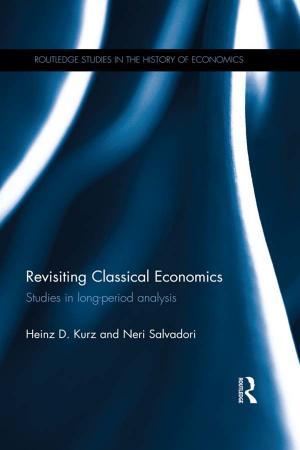Reconstruction and Cold War in Germany
The Kreditanstalt f�r Wiederaufbau (1948�961)
Nonfiction, History| Author: | Armin Grünbacher | ISBN: | 9781351150620 |
| Publisher: | Taylor and Francis | Publication: | November 28, 2017 |
| Imprint: | Routledge | Language: | English |
| Author: | Armin Grünbacher |
| ISBN: | 9781351150620 |
| Publisher: | Taylor and Francis |
| Publication: | November 28, 2017 |
| Imprint: | Routledge |
| Language: | English |
At the end of the Second World War Germany was devastated; her cities lay in ruins, industrial output was minimal, the economy was in tatters and her territories divided into four zones, each governed by one of the main Allied powers. Yet the rapid onset of the Cold War ensured that the western powers needed to re-establish a strong West German state to act as a bulwark against Soviet influence. In this study the critical role of the Kreditanstalt für Wiederaufbau (KfW) in this process is closely examined. Established by the Anglo-American occupying powers in 1948, the main remit of the KfW was to provide investment for German industry, to help kick-start the economy. Its particular function was to provide loans to key industries that the commercial banks considered too risky or which offered unacceptably low returns. Yet as this study makes clear, its work was from the outset highly politicized, and its role in German reconstruction went much further than simply providing funds for capital investment. Bankrolled mainly by American Marshall Plan counterpart funds, the KfW was viewed in Washington as an essential tool in the wider Western response to the challenges of Soviet communism. As is shown throughout the book, this dual role inevitably caused some difficulties, as national interests could be overridden in favour of Cold War considerations. As Germany's post-war economy revived, this led to further tensions between an increasingly prosperous and self-confident West Germany and the continued interference of the Allied powers, particularly the USA, who had their own Cold War agenda. Utilizing archives in Germany, Britain and the United States, Dr Grünbacher has provided a clear synthesis of this multi-faceted and complex subject. By approaching the economic development of Federal Germany through the locus of the KfW, he offers a fascinating insight into the interactions of economics, politics and ideology that will be welcomed by all scholars with an inte
At the end of the Second World War Germany was devastated; her cities lay in ruins, industrial output was minimal, the economy was in tatters and her territories divided into four zones, each governed by one of the main Allied powers. Yet the rapid onset of the Cold War ensured that the western powers needed to re-establish a strong West German state to act as a bulwark against Soviet influence. In this study the critical role of the Kreditanstalt für Wiederaufbau (KfW) in this process is closely examined. Established by the Anglo-American occupying powers in 1948, the main remit of the KfW was to provide investment for German industry, to help kick-start the economy. Its particular function was to provide loans to key industries that the commercial banks considered too risky or which offered unacceptably low returns. Yet as this study makes clear, its work was from the outset highly politicized, and its role in German reconstruction went much further than simply providing funds for capital investment. Bankrolled mainly by American Marshall Plan counterpart funds, the KfW was viewed in Washington as an essential tool in the wider Western response to the challenges of Soviet communism. As is shown throughout the book, this dual role inevitably caused some difficulties, as national interests could be overridden in favour of Cold War considerations. As Germany's post-war economy revived, this led to further tensions between an increasingly prosperous and self-confident West Germany and the continued interference of the Allied powers, particularly the USA, who had their own Cold War agenda. Utilizing archives in Germany, Britain and the United States, Dr Grünbacher has provided a clear synthesis of this multi-faceted and complex subject. By approaching the economic development of Federal Germany through the locus of the KfW, he offers a fascinating insight into the interactions of economics, politics and ideology that will be welcomed by all scholars with an inte















